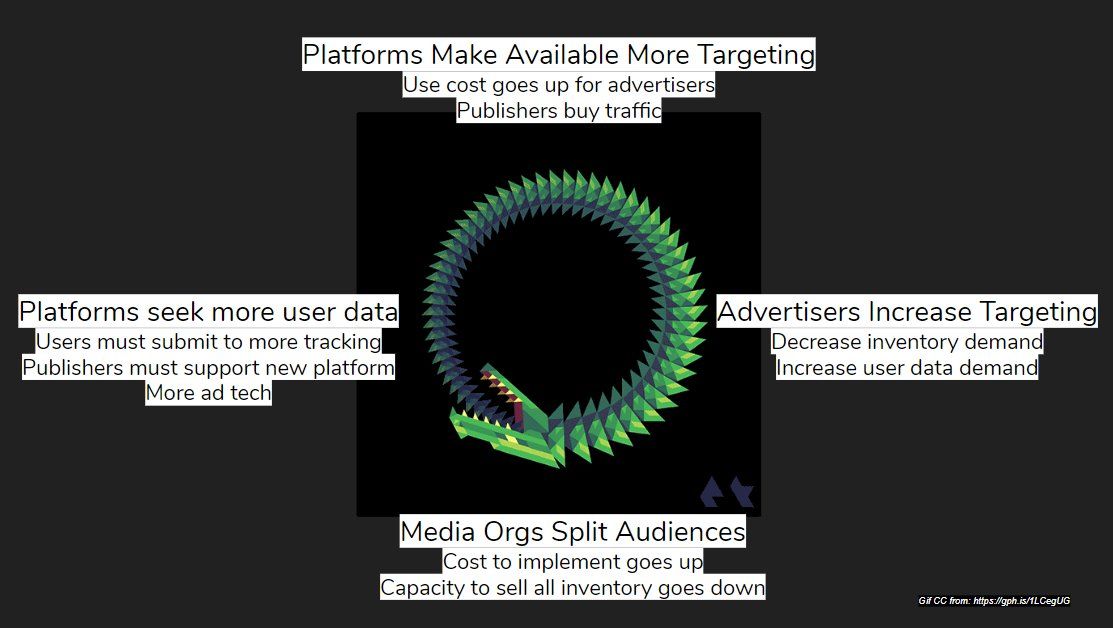-
Most ways ad tech targets ads against users, even in broad demographics, is generally specific enough to be discriminatory if anyone bothered to look into it. swodinsky/1270471961114787843
-
Like the obvious ones are redlining of specific discount offers for loans against geographic regions, something Facebook was called on to deal with, but is available via the rest of the advertising ecosystem. Job offers are the other obvious one...
-
I mean if you don't think that some jobs are targeted exclusively against age specifically or representative demographic categories that proxy for age generally then you have never talked with a recruiter for SV.
-
But specific user category targeting that drills down to the ad tech level can have multiplier effects on bad behavior that marketing does and has done for a long time in terms of assumed demographics. That's real a real complex sentence so it is worth explaining broadly:
-
Marketers have always sought and designed against demographics. The idea in the past was they could find broad proxies and they were often write, but the difference was when you design an ad to say proxy for targeting men by showing up in a sports mag, that is a permeable barrier
-
You could be a lady who liked sports, or you could know that there were coupons for buying programming kits in Sports Illustrated and go pick one up, or you could stumble upon it...
-
(Newspapers made those types of assumptions when they counted their readership based on multiple reads per household--different readers per one house--though that didn't always translate to advertisers beyond raw numbers.)
-
But in the world of modern demographically targeted ad technology this type of user-focused targeting is not a barrier easy to break through. If a marketer decides gaming is a dude thing and targets ads to dudes, it is a lot harder to build a profile that fits as a user.
-
In her article, Anjin Anhut talks about how even the basic demographic targeting of the print era creates cycles of reinforcement both in the marketing campaign and in the way products are designed. howtonotsuckatgamedesign.com/2013/12/marketers-fear-female-geek-2/
-
The cycle of marketing leading to more exclusive marketing leading to more stratified products is one that is both accelerated and tightened for the modern era of digital ad tech, and that can have proxy discriminatory results we don't think about at first.
-
I don't think anyone would disagree if I were to assume that a lot of gamers found their way into lucrative programming and computer science fields because of their start in the world of gaming...
-
Now we have some nasty proxy logic building when we follow that thinking to its conclusion... how many mundane demographics act as gateways to opportunity? You can likely think of quite a few. Now those mundane demographics that are being marketed to are harder to see than ever.
-
Now think of how marketers portray women and people of color in their campaigns. Now think of how those campaigns are targeted against seemingly mundane topics, now think about how those mundane topics might lead to less mundane work, opportunities, career connections...
-
Too much of the world of ad tech allows explicitly race-based demographic targeting. That logic inevitably leads to bad behavior and redlining. But that doesn't even touch upon how higher barriers to even seeing some marketing due to demographic proxies might have an impact.
-
Housing is, unfortunately, only the most obvious horror here. npr.org/2018/08/19/640002304/hud-hits-facebook-for-allowing-housing-discrimination
-
And Facebook is only the most obvious offender in this process. bbc.com/news/technology-45569227
-
The ad categories formed from demographics get ever more precise with user targeting on the web, and even worse they inform the algorithms that present what they think you are interested in. The greater marketing's precision, the more dangerous it becomes to equal opportunity.
-
The truly frighting thing that Facebook has brought into the ad tech marketplace is not just its precision, which every ad tech targeting firm seeks to duplicate, but its pricing model around precision.
-
Facebook has created a world where targeting is made more precise as a *savings measure*. This is a big change because if you wanted to buy a specific audience in the print era (say hobby knitters) you would have to pay big bucks for their specialty publication...
-
But if you've ever run a campaign on Facebook you've been reminded that the more *precise* you can make your targeting, the *cheaper* it is for you to reach your audience. It makes discriminatory targeting available to even the smallest budget. That's not good.
-
This is the core of demographically-based precision web targeting. It inherently asks you to look at groups, measure their value, & decide 1 group is more valuable than another.
-
That inevitably boils down to discrimination in some form when ad tech makes it hard to penetrate into a different group, by design. The ethics of this are obviously bad when advertising jobs. But they're questionable in any campaign w/these technical tools (all of them)
-
Just as bad is this standard means that either the entire world changes or the people who try to stay anonymous on the web get punished. W/o a data fingerprint you won't get anything but scams. A small opportunity to enter the life changing algo bucket turns into a 0 opportunity.
-
Browsing in incognito mode? Behind a VPN? With anonymity software? Unless the entire set of technological assumptions ad tech is built upon changes then you're going to be screwed when it comes to what ads and algos decide you should be presented with. Also, extra malvertising.
-
When I talk about ad tech, this is why I am most concerned about the middlemen, the ecosystem. The problems of ad tech aren't a single site or vendor, no matter how large they are, it is an entire landscape that needs regulation.
-
There are over 7000 ad tech products in the ad tech ecosystem. When the ad for the job you should have is explicitly targeted to not reach you every single one of them are culpable. Regulation is needed b/c otherwise you could spend a lifetime in lawsuits and not make a dent.
-
It's pretty gross if you put even the smallest amount of thinking into the inevitable aftereffects of this as a system. Too bad most ad tech companies and most engineers don't bother.
-
This is the dangerous mindset of most in ad tech, and we live in the desolation of their lack of care or ethical consideration. (From: wired.com/2016/05/the-perks-are-great-just-dont-ask-us-what-we-do/#.y2gtj0wln )
-
The discussion of this rightfully continues - Chronotope/1359867541934456841
 Chronotope’s Twitter Archive—№ 120,461
Chronotope’s Twitter Archive—№ 120,461
